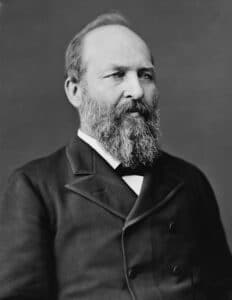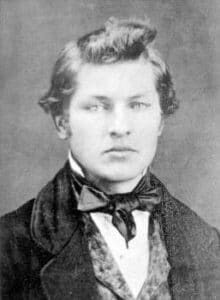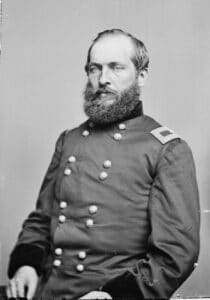Josh Reviews: GARFIELD by Allan Peskin
 James Abram Garfield is a man of somewhat complex character. It is tragic that he was allowed so short a time to serve, given that he had an otherwise dogged if not precisely stellar career. Finding a biography was surprisingly easy, as this 1978 biography is exhaustive and generally considered the “definitive” biography of Garfield. For a guy who was only president a few months, I was pleasantly surprised.
James Abram Garfield is a man of somewhat complex character. It is tragic that he was allowed so short a time to serve, given that he had an otherwise dogged if not precisely stellar career. Finding a biography was surprisingly easy, as this 1978 biography is exhaustive and generally considered the “definitive” biography of Garfield. For a guy who was only president a few months, I was pleasantly surprised.
Allan Peskin was a professor for most of his life at Cleveland State University. In addition to this biography of Garfield, he also wrote a biography of Winfield Scott.
After reading about Hayes, Garfield presents an interesting foil. Garfield was not wealthy, and struggled for money much of his life. He was a lawyer who never really practiced. He had a largely uneventful if not lackluster military career. He was not particularly honest. Hayes was really the opposite – the president most wounded by the civil war, and aside from Grant, the one most involved. Where Hayes was earnest in his desire to serve, Garfield comes off a little less patriotic and a little more political. How could one expect to compete for office without serving?
Peskin presents us, of course, with the Garfield that there is to find in records and memories. He certainly doesn’t agree with the worst criticisms of the man, such as Hayes’ dismissive ‘he was weak’ remark. It’s hard to know if Garfield would have made a strong president. Peskin certainly argued that he would have been and that he was, when he had the chance, but any reader of the book has to admit that despite Peskin’s strenuous conclusions, Garfield seemed easily pulled from all sides, weak in his decisions and easily manipulated by his secretary of state, James Blaine.

Like any man who became president, Garfield was not without his strengths. He was a manlier man than Hayes, though he, like Hayes, grew up largely without a father. Garfield was less of a scholar but certainly a singular mind, with his love for economics and his passion project of hard money. Hayes was softer in almost all of the ways that Garfield was rough – even in images, Hayes seems approachable, Garfield grumpy. Garfield was not unfriendly but not exactly affable, given to stump speaking and a gifted ability to raise to the occasion of a speech.
Peskin manages to be balanced about his reading of the man, however. When Garfield found himself mired in scandals with banks and railroads, Peskin provides Garfield’s denials and does an excellent job of dissecting the facts. Without hard evidence, occasionally, Peskin gives excellent explanations as to why Garfield’s defenses ring true or false, and as often as not Garfield appears more disingenuous than truthful.
The book took me a while to slog through. This is not because it is the driest of books I have read (Bauer’s Zachary Taylor biography, Cleeve’s W.H. Harrison biography, and Ketcham’s Madison were drier, I think) but there does seem to be an immense amount of attention spent on some subjects that makes the book drag. Garfield’s few months in office are given much more time than I expected, for instance. The real reason I think I struggled though was that Garfield as a character left a bad taste in my mouth. He has a penchant for being mopey and losing faith in himself, a determined but somewhat pompous (compared to some other presidents) sense of destiny concerning his own political rise (ad nauseum, honestly) and was not especially sentimental. In all of these things I had to compare him to Hayes, also from Ohio, and in most of them Garfield came out the loser, at least in my opinion.

The truth is I simply LIKED Hayes a lot more, while Garfield struck me as somewhat abrasive. For one thing, Peskin does an excellent job of reading politics and events of the day from Garfield’s perspective, and I ultimately disagree with a lot of Garfield’s opinions. Garfield was a fan of General Rosecrans and a hater of General Grant (despite Garfield being AT Chickamauga, where Rosecrans royally crapped the bed). Garfield was also unfailingly critical of Lincoln. My admiration for Lincoln and Grant both, I think, made him harder to swallow as a person.
A little too academic and at length for any casual reader, it is certainly the most comprehensive biography of this overlooked president I could find, and if you are looking for one to truly get into the times, this book is an excellent choice.

